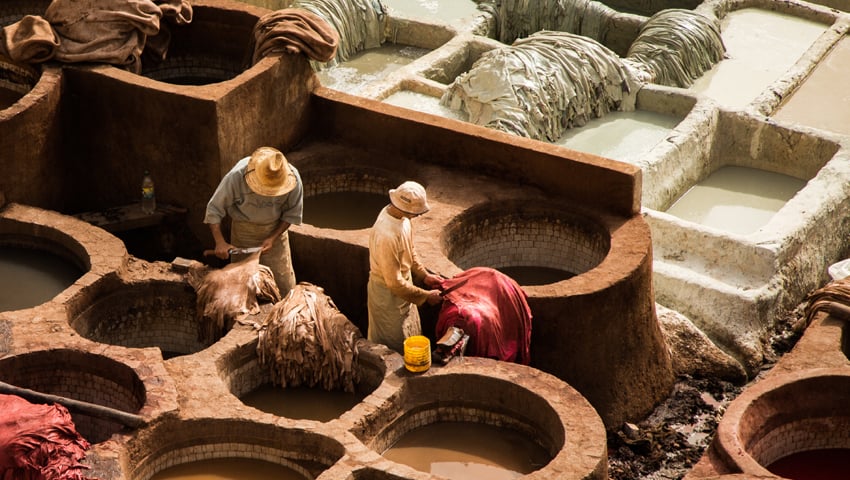VOGUE magazine reports that a new cross-industry collaboration led by Textile Exchange and Leather Working Group aims to rid leather supply chains of deforestation and improve transparency. There are complex challenges to overcome, but signatories from Kering to H&M say they are ready to try.
The Leather Working Group says that in a global effort to address deforestation and promote sustainable practices within the leather industry, non-profit organizations Textile Exchange and Leather Working Group have joined forces to launch a Deforestation-Free Call to Action for Leather. This initiative aims to create transparent and equitable supply chains, protecting our natural ecosystems.
Cattle rearing is one of the drivers of deforestation, along with other commodities such as soy and palm oil. It is also a contributor to the conversion of natural ecosystems such as grasslands and savannahs. While beef production is what drives cattle farming, the leather industry has an opportunity to influence change.
Currently, industries are at varying stages of tackling deforestation and conversion. For brands and retailers that are using leather, they have the task of transforming long, complex, and often opaque supply chains, to be able to address the issue directly and drive positive change at the source.
The Deforestation-Free Call to Action for Leather
The call to action is a collaborative initiative that calls upon brands and retailers to commit to sourcing all their bovine leather from deforestation-free supply chains by 2030 or earlier. The guidelines were developed in consultation with WWF, the National Wildlife Federation (NWF), and the Accountability Framework initiative (AFi). The initiative sets clear expectations for brands, providing them with tools and guidance to support them on the journey.
To date, notable signatories include adidas, American Eagle Outfitters, Inc. (AEO), AllSaints, Arezzo&Co, BMW Group, Capri Holdings, H&M Group, Icebug, Kering, Mango, Marks & Spencer, PUMA, Range Revolution, Reformation, Roots, R.M.Williams and Tapestry.
The Deforestation-Free Call to Action for Leather has outlined several key objectives aimed at transforming the leather industry and promoting sustainability. It seeks to catalyse change within the entire leather value chain though collective action. By aligning their actions, brands can have a positive impact on driving sustainable practices at a greater scale.
The initiative emphasizes the need for a more equitable distribution of responsibility and investment in protecting forests and ecosystems. It encourages engagement and investment, rather than divestment, that will ideally lead to an increase the number of cattle farms that are verified to be deforestation-free and can subsequently provide a deforestation-free source of hides to the leather industry.
Greater traceability, visibility, and improved communication within the long and complex supply chains is also essential to support the aims of the initiative. Working towards greater transparency will allow brands to reward and promote deforestation and conversion-free practice.
Lastly, the initiative emphasizes the importance of reporting collective progress, highlighting the positive changes being made by participating brands and fostering transparency within the industry. These objectives together form a comprehensive approach to addressing deforestation and driving sustainability in the leather sector.
Anne Gillespie, is the impact acceleration director at Textile Exchange. Speaking to Vogue magazine she said that the initiative will be split into two phases. Phase one is about preparing supply chains for this change, and phase two is when brands actually start sourcing deforestation-free leather. “We are dealing with complex, global issues here, and everyone has a part to play,” she says.
It won’t be an easy switch. Leather supply chains are long and difficult to navigate often spanning not only multiple industries, but also conflicting regulations and attitudes towards best practice, which can vary by region. Historically, brands have sourced leather from tanneries, so many lack oversight beyond this point. The biggest challenge will be mapping leather supply chains down to the farm level, which is where deforestation happens.
Vogue says “For the brands involved, the call to action chimes with their existing sustainability goals, especially around biodiversity. Puma has committed to reduce the loss of biodiversity and habitat destruction caused by its production processes and material sourcing by 2025. Brazilian brand Arezzo & Co started its internal leather traceability project in 2022, and has signed the call to action with the hope of scaling its efforts in partnership with larger, global brands.”
Looking Ahead
The Leather Working Group says that the launch of the Deforestation-Free Call to Action for Leather marks an important milestone in the leather industry’s journey toward sustainability and responsible sourcing. As more brands sign on and commit to the initiative, the collective impact has the potential to be significant. The increased availability of verified deforestation-free leather will contribute to a more sustainable and transparent industry, fostering collaboration, and inspiring further innovation.
In line with the incoming EU Deforestation Regulation, Textile Exchange and LWG have set a cut-off date of 31 December 2020, meaning that any farms that engaged in deforestation after this point will be deemed non-compliant.
The success of the Deforestation-Free Call to Action for Leather hinges on the continued commitment and collaboration of all stakeholders involved. Leather Working Group envisages a world where leather is sourced, produced, and used sustainably, protecting people and the planet, and this collaborative initiative supports our efforts towards achieving that through the protection of the world’s forests.
In a bid to build trust and alleviate some of the inequalities rife in leather supply chains, the call to action encourages brands to use the impact incentives in Textile Exchange’s Leather Impact Accelerator (LIA) programme to support farmers through the necessary changes. The call to action highlights the need to protect human rights in the transition, especially Indigenous communities, many of whom have been historically denied their rights and subject to land-grabbing.
